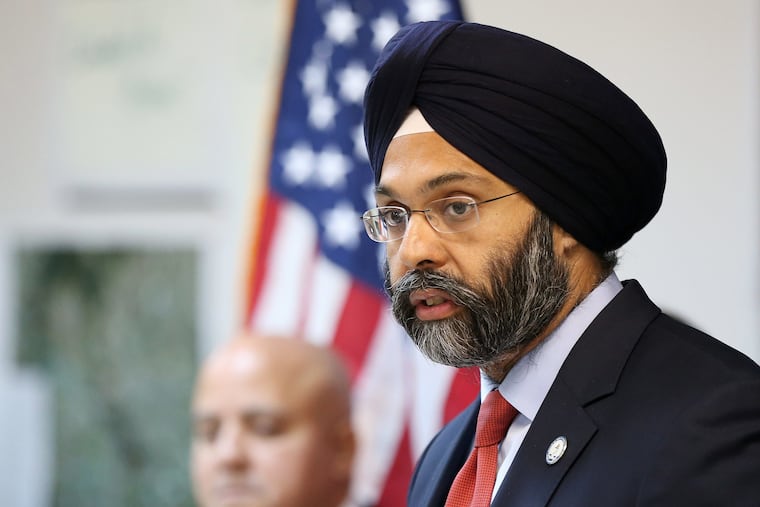N.J. police departments ordered to identify officers who have been fired, suspended, or demoted for misconduct
For years, only officers charged with crimes were publicly identified by some departments. Monday’s order also permits law enforcement agencies to identify officers who have committed violations in the past, and the state police pledged to release two decades' worth.

New Jersey law enforcement agencies must begin disclosing the names of officers who commit serious disciplinary violations, and the state police will publicly release 20 years of troopers’ infractions, state Attorney General Gurbir S. Grewal said Monday.
In past years, officers subject to discipline have typically not been publicly identified unless they have been criminally charged. But according to Grewal’s order, every state, county, and local law enforcement agency will now be required to publish an annual list of officers who were fired, demoted, or suspended for more than five days due to a disciplinary violation. The first list is to be be published by the end of this year.
In doing so, New Jersey will join about a dozen states that make police disciplinary records available in cases involving serious violations that result in suspensions or other punishments. In many other states, including Pennsylvania, such records are not available to the public.
“Today, we end the practice of protecting the few to the detriment of the many," Grewal said in a statement. "Today, we recommit ourselves to building a culture of transparency and accountability in law enforcement.”
The move follows efforts by advocates in recent weeks — since the death of George Floyd at the hands of Minneapolis police stirred national outrage and protests — to push for greater transparency in how police departments handle internal records. On Monday, Pennsylvania lawmakers advanced bills that would create a database with information on disciplinary actions, performance evaluations, and attendance records that agencies would consult as part of a background check.
Citing Floyd’s death, Grewal had announced this month that the state would update its guidelines governing the use of force by police for the first time in two decades. And in December, his office announced measures aimed at improving transparency in police departments, including more quickly making available surveillance video from crimes involving police, and tracking statewide data on use-of-force incidents.
» READ MORE: N.J. to overhaul police use-of-force guidelines, attorney general says
Monday’s order also permits law enforcement agencies to identify officers who have committed violations in the past. Grewal’s office said the New Jersey State Police plans to next month publish a list of all state troopers who have committed major disciplinary violations over the last 20 years.
Pat Colligan, president of the New Jersey State Policemen’s Benevolent Association, the state’s largest police union, said his group supports cracking down on officers who abuse their power. But the order does not account for the widespread differences in disciplinary actions from department to department, he said, meaning that the law could expose some officers to public scrutiny for violations related to late attendance, abuse of sick time, or other infractions he characterized as employee-employer issues.
“What could be a one-day suspension at one department could be a five-day somewhere else,” he said. “These police chiefs are all over the map, they’re not using the same rule book. That makes this, to me, potentially very intrusive."
He said the association’s lawyers would review the order to ensure that officers’ rights are protected.
Other than cases that result in criminal charges against the officer, the only times when police internal affairs records have been released in New Jersey are in cases that reach the state Civil Service Commission or the Office of Administrative Law on appeal.
Earlier this month, in announcing plans to overhaul New Jersey’s use-of-force guidelines, Grewal also said he wants to require a statewide licensing program for all officers. A week later, prosecutors in Camden County charged Woodlynne Officer Ryan Dubiel with simple assault for pepper-spraying two people without provocation. Dubiel had worked in nine departments before Woodlynne — highlighting, Grewal said then, the need to enforce standards across the profession.